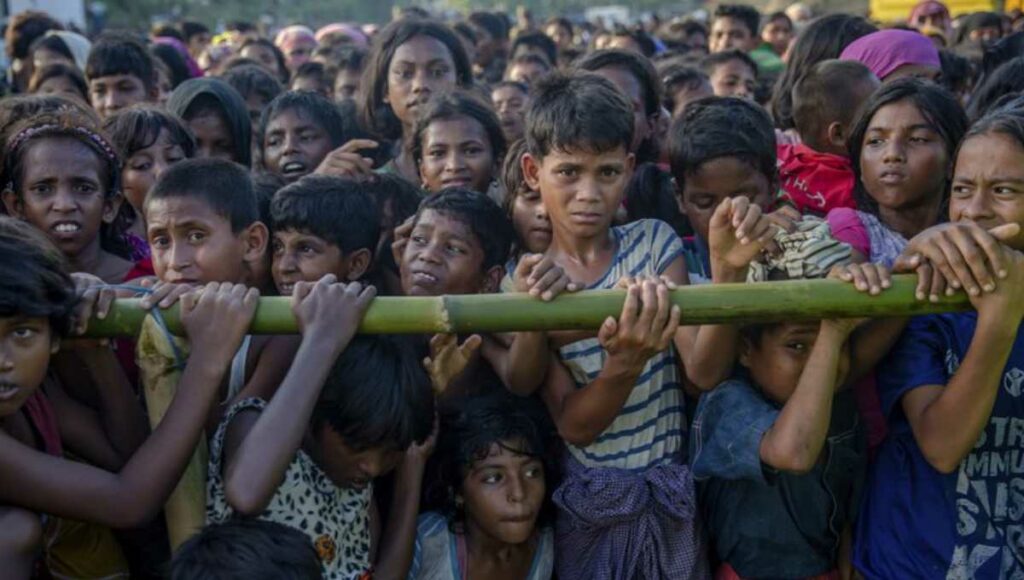Our flawed humanitarianism

When the logic of profit overrules humanity
Rohingya people have been taking refuge in Bangladesh after being subjected to intimidation and torture in their homeland Myanmar. The latest influx in 2017 was the largest in history — more than 700,000 Rohingya crossed the border into Bangladesh for safety.
Anyone visiting the refugee camps in Cox’s Bazar will be astonished by the scale of humanitarian responses led by the UN.
Bangladesh’s initiatives to repatriate the Rohingya have failed twice because of their non-cooperation as citizenship in Myanmar, safety, recognition of Rohingya identity, restoration of lives, and trial of the people involved in atrocities are not ensured.
Going back is an impossible task for the Rohingya, as China and Russia have barred the UN Security Council to intervene. Even the latest UN report remarked that around 600,000 Rohingya are living in “deplorable” conditions in Myanmar.
With widened purview, it becomes palpable that the international response to the crisis is crippled by economic-political alliances. Strikingly frustrating is the present-day humanitarianism that I find being burdened by the capitalist logic of profit.
Attacks on the Rohingya were sparked by resource conflict, not ethno-religious issues. The latest attacks were specifically designed to free up natural resources for planned agricultural development.
There are plans of establishing gas and oil pipelines through Kyaukphyu to Western China, a port in Sittwe, and a Special Economic Zone in Maungdaw. Mass murder and expulsion of Rohingya are, thus, spurred on by the possible economic profits as Saskia Sassen in two of her 2017 articles has also argued.
One may claim that there have been historical tensions between the Burmese Buddhists and other ethno-religious groups. Nonetheless, Myanmar could get away with the mass killings because of their geo-political and economic alliances with China while other superpowers remain ignorant.
In the book Humanitarian Business, Thomas Weiss argued that the logic of helping people at risk, irrespective of race and identity, positions humanitarian action at a moral high but does not really address why they are in need, owing to the burden of capitalism.
This fact is demonstrated by the day-to-day functioning of aid agencies as actors engaged in resource acquisition and distribution. Humanitarians might be offended by being analyzed as part of a capitalistic process.
However, it cannot be denied that operations of humanitarian agencies involve four “Ps” of marketing — product, price, place, and promotion. A visit to the website of the WFP, Unicef, or UNHCR, for example, clarifies how the imagery of human sufferings is being sold in the global market of donations.
To attract contributions from donors who wish to help people at risk, aid agencies portray images depicting human miseries. Thereafter the donors want assurance that their contributions are improving lives, which then requires the publications of brochures illustrating successes of relief works.
Being aware of the marketing procedures, we cannot undo seeing Rohingya people behind fences when on February 4, UNHCR special envoy and Hollywood star Angelina Jolie visited the Rohingya camps and gave her speech for TV, we have also seen her posing with Rohingya children, all being commoditized for the global humanitarian market.
Political-economic turbulences in different parts of the world have intensified the need for relief and competition for donations. For Rohingya response from March to December 2018, the UN and its agencies called for $951 million for delivering life-saving assistance but received 69% of the need.
In 2019, they appealed for $920m, of which 36% were collected until August 2019. In a neoliberal world, it is not surprising to see that the logic of capitalism is shaping humanitarianism.
While humanitarians focus on the delivery of the life-saving products, there remains business behind the scenes, as manifested by the financial misconducts, for example in Uganda.
The UN’s internal audit reports have identified that during July 2016-December 2017, UNHCR’s Uganda operations wasted tens of millions of dollars. They had overspent on various services as well, as awarded contracts to questionable entities.
Although the UN Refugee Agency repeatedly claimed the funds meant for humanitarian response to the Rohingya are not misused, we find it very hard to believe.
Inquiry into the nature of expenditure reveals that INGOs spent only 18% of their funds on the actual program and 82% on operation cost according to estimates published in 2019 by the Cox’s Bazar CSO-NGO Forum.
The criticism is valid, as UN agencies do not disclose their actual operation costs. There have been allegations that foreign NGOs spend $17.87m for hotel bills in six months and charge high salaries for local and international employees.
NGOs operating humanitarian relief are criticized for supplying goods not culturally appropriate that eventually end up in the local market. However, the distribution of those unfit products tick-marks the completion of project activity.
The humanitarian crises are corollaries of capitalism, so is humanitarianism. The logic of humanitarianism is based on the most restricted definition of life, in Walter Benjamin’s words “life itself.” For protection of their life, thousands of refugees are congregated and assisted in huge camps.
A world of its own, refugee camps remains guarded territorially and morally as tightly as possible.
Thus, humanitarianism is reduced into a facade. We must have the desire to comprehend, and the will to transform inequality and injustice prevailing in the existing world order. If not, the humanitarian crisis will never be eliminated with our flawed humanitarianism.
Mohammad Tareq Hasan is an anthropologist and teaches at the University of Dhaka.

